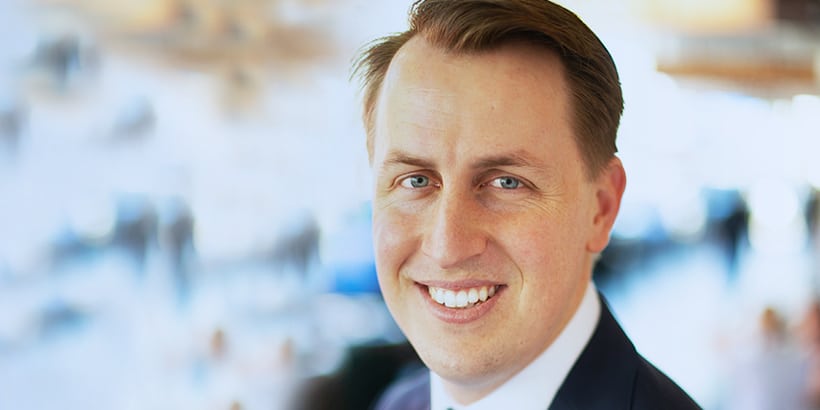
Don’t blow the summer holidays, check your gas BBQ bottles, warns AMA (NSW)
November 19, 2022
Showing up
November 21, 2022PRESIDENT’S WORD
Protecting doctors in private practice
Verbal and physical assault from aggressive patients is not uncommon in private practice and as such, it’s important doctors in all settings are covered by legislation that applies tough penalties for offenders who assault health workers.
A few years ago, just before closing, a new patient walked through the door. It was obvious when he was booking in with the receptionist that he was upset, but initially it wasn’t clear why.
Once inside my consultation room, he asked for a scheduled medication. Prescribing scheduled medication is something I do rarely, and certainly not for a new patient. As I was trying to ascertain why he was seeking this medication, the patient became increasingly agitated, and very demanding.
While our consultation rooms are beautifully designed spaces, they all situate the patient closer to the door, with the practitioner’s desk further away. They offer privacy for patients and practitioners, but in this moment, the isolation made me feel vulnerable. For those who haven’t met me, I’m not a small person. As a 6’5’’ man, rarely do I feel physically intimidated. However, this experience had all the hallmarks of a bad situation – a large, drug-seeking, angry male that wasn’t getting what he wanted.
I considered pushing the alarm button under my desk, but I was conscious that the only other person in the practice was our receptionist, and I was worried about also putting her at risk.
As his anger escalated, I slowly wheeled by chair backwards. I anticipated his punch and managed to be out of range. I quickly moved to door and left the room before he could turn on me again. I closed the door behind me and walked to the waiting room. After a few moments, he followed me out. By this time his anger had dissipated, and I was feeling a little more secure standing behind the large receptionist desk. At this point, I firmly told him the consultation was over and he left the practice.
While I was unharmed, the experience left me rattled. My mind played through all the potential ‘what ifs’. What if he had connected with his punch? What if he knocked me out? What if he turned on the receptionist?
Thankfully, I won’t know the answer to those questions, but I know from my conversations with colleagues, many of you do. I’m cognisant that my own physical presence means I haven’t had to deal with threats to my safety to the same extent as some of my other colleagues. I don’t regularly check over my shoulder, feel scared walking alone to the car, or going for a night-time jog. My experience likely pales with the fear that many others deal with on a daily basis. But my point is within the four walls of a consultation room all of us are at increased risk of violence, and therefore we deserve to be extended the same protections as healthcare workers in other settings.
Verbal and physical assault in medical practices is sadly not uncommon in private practice. The extent to which this occurs is not entirely clear, as previous reports into occupational violence towards healthcare workers in Australia have highlighted there is significant under-reporting.
The first national study to be conducted in Australia examining the incidence and prevalence of violence against general practitioners and general practice staff was conducted between April 2009 and March 2010.
It found almost all GPs and practice staff had experienced verbal aggression at some point in their career and 72% of GPs had experienced verbal aggression in the last 12 months.
In addition, GPs experienced physical aggression with damage to property (37%) being most frequently mentioned.
Much like my own experience, GPs in the survey identified that they were at most risk of aggression when the practice was closing for the day.
Triggers were identified as when the practice was short staffed and when GPs are running late.
The Medicine in Australia: Balancing Employment and Life (MABEL) longitudinal survey conducted between 2010 and 2011 of almost 10,000 Australian doctors found 70.6% reported experiencing verbal or written aggression, and 32.2% reported experiencing physical aggression in their previous 12 months of practice. General practitioners reported slightly lower rated than hospital colleagues in that survey, but incidents were still high – 54.9% verbal aggression, 23.4% physical aggression.
Given these alarming statistics it’s clear more needs to be done to protect medical professionals working in private practice.
The Crimes Legislation Amendment (Assaults on Frontline Emergency and Health Workers) Bill 2022 (“the Bill”) which came into effect on 19 October 2022 amended the Crimes Act 1900 (“the Act”) to create new offences in relation to assaults on, and other actions in relation to, certain workers and officers including health workers. These reforms will ensure tougher penalties for offenders who assault certain health workers in the course of their duties.
The law carries new offences ranging from 12 months to 14 years in prison for assaulting frontline health or emergency workers.
The laws were introduced in response to the unacceptable violence that increased with the COVID-19 pandemic.
During the consultation process, AMA (NSW) submitted that the application of the Bill be extended to include all settings (including medical practices) where health services are provided, including in patients’ homes. This submission was based on feedback from members who had personally been the victim of an assault in the course of their private practice.
However, the Bill limits the definition to “frontline health worker” rather than capture all health workers. Accordingly, the Bill applies specifically to paramedics, pharmacists and pharmacy staff, community first responders, community health workers, persons engaged to provide medical treatment to patients in hospitals and other similar health institutions, and persons engaged to provide security services in hospitals and other similar health institutions.
In effect, the Bill excludes a range of healthcare providers, including general and private practitioners, from the application of the Bill by reason of the location of their practice (which is not in a hospital or other similar health institution).
AMA (NSW) is calling on the NSW government to reconsider the definition of “frontline health worker” as encompassing any person engaging directly with patients in a health-related capacity, independent of the location.
Patient aggression is a major contributor to doctor burn-out, and at a time when many general practitioners are questioning the financial sustainability of continued practice these incidences could exacerbate the already critical GP shortage.
Tougher penalties are not a complete solution – there must also be a focus on prevention – but they are a signal to patients about seriousness of this kind of anti-social behaviour. It’s also a signal to medical professionals about the value of their role in society. This is particularly important, given that years of chronic underfunding by successive Governments has left doctors – particularly general practitioners – feeling undervalued and taken for granted.
AMA (NSW) has been surveying its private practice members about the verbal and physical aggression they face and will be releasing the results of that survey shortly, along with an advocacy campaign targeting NSW.

